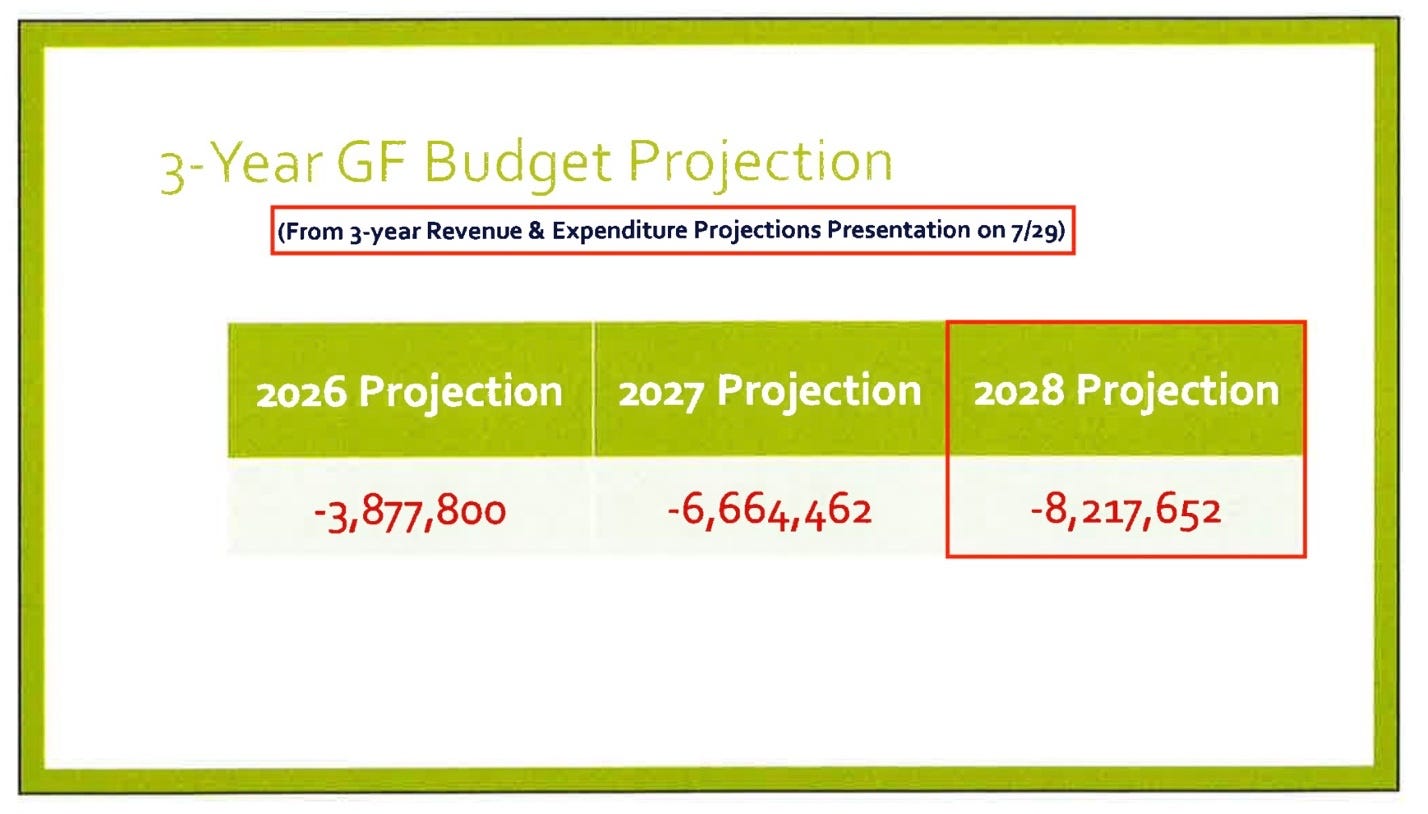Whatcom County just proved what a Charter Review can accomplish when leaders prioritize the public—performance audits, budget transparency, real accountability. Meanwhile, Clallam County has spent nearly a year debating feelings, deflecting questions, and guarding special interests. Instead of reforms that strengthen good governance, the Review has devolved into a masterclass in how political loyalties, personal ideology, and fear of offending powerful players can override the interests of 76,000 Clallam County residents. And with an $8.2 million general fund deficit projected in just three years, taxpayers deserved seriousness—not the performative outrage, name-calling, and special interest politics that dominated last week’s meeting.
Whatcom vs. Clallam
Washington has seven Charter counties. Whatcom’s 2024 Charter Review resulted in multiple major reforms—performance audits, budget transparency, and stronger financial oversight—all appearing on the 2025 ballot, all passed by voters. Their commissioners treated the Charter Review as a tool for the people. [Watch Glen Morgan’s commentary on Whatcom County’s Charter Review process starting at 17:15].
Clallam County’s Charter Review? After ten and a half months, voters saw one non-controversial amendment on the ballot—simply correcting the coroner position to match state law. One more amendment (requiring commissioners to hold real town halls with real Q&A) will be on next year’s ballot thanks to Commissioner Nina Sarmiento. She listened to the public who said clearly they feel unheard and shut out.
That’s it. Ten months. Two modest reforms.
A simple good-governance amendment dies—because it offended political loyalties
The most meaningful proposal arrived last Monday from a committee chaired by former county commissioner Ron Richards. For at least a decade, the federal government has repeatedly asked Clallam County Commissioners a basic question:
What impact will these tribal trust land conversions have on county revenue, and how much tax revenue will be removed from the rolls?
For at least a decade, the commissioners have refused to answer—effectively rubber-stamping the conversions by remaining silent.
Richards’ amendment required commissioners to simply respond to these federal letters. Not oppose tribes. Not block tribes. Not comment on tribes.
Just answer the questions.
Basic good governance.
Yet Charter Review Chair Susan Fisch came out forcefully against it. Her objection? She “believed” it targeted the Jamestown S’Klallam Tribe—despite the amendment not naming any tribe, despite federal letters applying to all tribes, and despite the committee requesting information on all tribal acquisitions but only receiving Jamestown data.
Instead of debating facts, Fisch, a retired judge, debated policy based on her belief—accusing without evidence.
The conflict nobody wants to touch
Fisch is not only the Chair of the Charter Review Commission. She is also the Secretary of the League of Women Voters.
Since Fisch is the Secretary of the League of Women Voters, it’s important to understand their land acknowledgment that explicitly pledges to:
“Amplify the voices of Indigenous people”
“Partner with tribes on policy”
“Respect the sovereignty of tribes”
“Support issues important to their welfare”
All noble goals.
But Fisch didn’t take an oath to the LWV.
She took an oath to the citizens of Clallam County.
That leaves one unavoidable question:
Is Fisch serving the voters—or serving sovereign governments that already have their own representatives?
On Monday, that conflict showed itself plainly when she rejected a neutral amendment based not on fact, but on her perception that it felt anti-tribal.
That’s not good governance. That’s loyalty conflict.
Paul Pickett: When disagreement becomes “racism”
Commissioner Paul Pickett reacted even more aggressively to Richards’ proposal. Opposing the amendment, he said, it was a “dogwhistle for racism.” He also argued that tribes “subsidized” Clallam County by $125 million last year.
He explained, “And I say that because that’s the total tax revenues collected by the county that they wouldn’t have collected if the tribes hadn’t signed treaties giving up their rights to this land.”
Setting aside the historical leap involved in that argument, Pickett also described tribes as historically impoverished, plagued with alcoholism, and told his co-commissioners and public commenters that they “should feel uncomfortable.”
He cited his “40 years” of tribal work and government-to-government training as proof that his interpretation must be correct.
Disagree?
Then you’re ignorant, racist, or both.
It’s the same pattern appearing in his writing for Clallam Democrats Rising, where political opponents are frequently painted as extremists.
And that pattern continued in his flattering profile of Commissioner Mark Ozias.
The Softball Profile of Mark Ozias — and What’s Missing
Pickett’s “interview” with Commissioner Mark Ozias doesn’t resemble journalism. It reads like a warm-up brochure for a reelection campaign. What’s glaring isn’t what he wrote — it’s everything he refused to ask.
No questions about why county spending keeps climbing.
No mention of economic development or business growth.
No inquiry into why infrastructure, public safety, and housing all worsened under Commissioner Ozias’s decade of leadership.
No accountability for land-use decisions, water policy, or the steady march of tax and fee increases.
Not even a passing reference to the relocation of Towne Road, flooding at 3 Crabs, or other debacles that plague his district.
Instead, Pickett served up questions straight out of a partisan endorsement meeting:
“What has been the highest point of your career as a Democrat?”
Commissioner Ozias’s answer?
COVID relief money.
After ten years in office, his proudest accomplishment wasn’t a local reform, a community win, or fixing any of the issues residents repeatedly raise. His highlight was spending federal pandemic dollars.
Then came the rest:
“How do we pass the Democratic legacy to future generations?”
“What advice do you have for young Democrats?”
“What leadership positions helped prepare you?”
These are not questions for an elected official steering a county on the brink of an eight-figure deficit. These are questions you ask when you want your preferred candidate to look good.
And then came Ozias’s most tone-deaf line:
“Older persons should not talk about their wisdom and experience. They need to listen…”
So the people who built this county, pay its taxes, and fund its programs should stay quiet now?
Pickett reinforces that same framing in another article claiming that right-leaning youth groups are “fascist” while urging “progressive youth” to organize. It’s a pattern:
Disagree with them? You’re a fascist.
Support a neutral charter amendment? You’re racist.
Think independently? You’re the problem.
This isn’t how you build a functioning, bipartisan community.
It’s how you push people out of the two-party system entirely — and how you lose the public’s trust.
Meanwhile—Clallam County’s revenue crisis grows
While the Charter Review spirals into ideological theater, here’s the reality:
County officials are projecting an $8.2 million shortfall in just three years.
At the same time:
Millions in taxable land continues disappearing into trust status
Commissioners refuse to answer federal financial requests
Charter amendments are shot down
Budget transparency reforms go nowhere
Whether one supports or opposes trust conversions is beside the point.
The county must understand the financial impact, especially during a looming fiscal crisis.
Silence is not a strategy.
And ignoring revenue loss won’t make the deficit shrink.
The real consequence: A county without true representation
What happened in last week’s meeting makes one thing clear:
Paul Pickett and Susan Fisch are not defending the public’s right to clarity or accountability.
They are defending their worldview.
Pickett brings the ideological lens of the Clallam Democrats Rising newsletter—where everything is partisan, where dissent is extremism, and where uncomfortable truths are reframed as moral failings.
Fisch brings the obligations of an organization openly pledged to advance tribal interests—an organization she serves simultaneously while chairing a review meant to represent all Clallam County voters.
Both perspectives may be sincere.
But neither serves Clallam County first.
And strangely—maybe we owe them thanks
Because it’s people like Paul Pickett and Susan Fisch, with their reflexive accusations, rigid ideologies, and unwillingness to allow basic government accountability, who unintentionally highlight why so many people are walking away from rigid party structures.
Every time they call someone a racist for asking financial questions…
Every time they dismiss independent thinkers as fascists…
Every time they sideline taxpayers in favor of ideology…
They push more residents toward independent thought, independent voting, and independent scrutiny.
And if Clallam County is ever going to get a government that puts the public first, that shift may be exactly what this county needs.
















